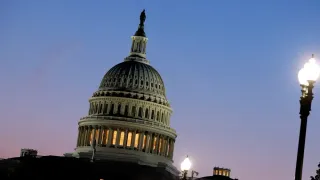April 11, 2023
Fancy a Dip? An Olympic Reboot for Paris' Toxic River Seine
John Leicester READ TIME: 3 MIN.
Even before he has dipped his toes into the murky waters of Paris ' famous but forbidden River Seine, French triathlete Thibaut Rigaudeau is already fielding questions from disbelieving friends.
"Are you scared of swimming in the Seine?" he says they ask him. "It looks disgusting.'"
For decades, it was. Though immortalized in art, literature and song, and cherished by lovers who whisper sweet nothings or tearfully part on the privacy of its banks, the river was ecologically dying. It was too toxic for most fish and for swimmers, largely useful only as a waterway for goods and people or as a watery grave for discarded bicycles and other trash. Swimming in the Seine has, with some exceptions, been off-limits since 1923.
Now, however, its admittedly unappetizing green-brown waters hide a tale of rebirth.
A costly and complex cleanup is resuscitating the Seine just in time for it to play a starring role in the 2024 Paris Olympics and, after that, for it to genuinely live up to its billing as the world's most romantic river, one that's actually fit again for people. And in a warming world, a renewed ability to take cooling dips in the river should help France's capital remain liveable during increasingly frequent heat waves. It possibly might also inspire other cities to invest in reclaiming their waterways.
"It will create waves, so to speak, across the world because a lot of cities are watching Paris," says Dan Angelescu, a scientist who is tracking the Seine's water quality for City Hall, with regular sampling.
"It's the beginning of a movement," he says. "We hope so, at least."
The Olympic deadline has supercharged a cleanup that has been decades in the making. Without the imperative of having to be ready for 10,500 Olympians in July and August next year, followed by 4,400 Paralympians, City Hall officials say it would have taken many more years to fund the multi-pronged, 1.4 billion-euro ($1.5 billion) effort. Because as well as hosting outdoor swim races, the Seine is going to be the centerpiece of Paris' unprecedented Olympic opening ceremony. For the first time, it will take place not in a stadium setting but along the river and its banks.
So it needs to be ready. Officials have been going after homes upstream of Paris and houseboats on the Seine that were emptying their sewage and wastewater directly into the river. An Olympic law adopted in 2018 gave moored boats two years to hook up to Paris' sewage network. Sewage treatment plants on the Seine and its tributary, the Marne, are also being improved.
And more than half a billion euros (dollars) is going into huge storage basins and other public works that will reduce the need to spill bacteria-laden wastewater into the Seine untreated when it rains. One storage facility is being dug next to Paris' Austerlitz train station. The giant hole will hold the equivalent of 20 Olympic swimming pools of dirty water that will now be treated rather than being spat raw through storm drains in the river.
City Hall says the water quality is already improving and that there are many more types of fish than the two or three species that were the only ones hardy enough to survive in the filth a few decades ago. It says samples taken daily last July and August in the stretch of river where Olympians and Paralympians will compete showed the water quality was overwhelmingly "good." By their sports' standards, that means acceptable.
Setting off from the Seine's ornate Alexandre III bridge, triathletes will race first in 2024, with men on July 30, followed by women the next day. Then come marathon swimmers, on Aug. 8 and 9, and para-triathletes on Sept. 1 and 2.
Rigaudeau, who competed in para-triathlon at the 2021 Tokyo games, is thrilled by the prospect. He's hoping for an early taste of the experience when Paris hosts warm-up swims in the Seine this summer to hone its readiness for 2024. It will be Rigaudeau's first-ever dip in his home river.
"We will be the 'testers,'" he says. "I hope we don't get sick."
After the games, the river should then reopen to everyone – in the summer of 2025. City Hall says five potential bathing spots are being studied within Paris itself, with others a bit further afield.
Officials hope that after so many years where swimming in the Seine was unthinkable, Parisians will start to feel that it's safe to go back in the water when they see Olympians and Paralympians leading the way.
"It's going to change our lives," Rigaudeau says. "But it's also true that because everyone thinks that it's really very dirty, I'm not sure if people will go of their own accord, at least at first."
___
Jeffrey Schaeffer in Paris contributed. More AP coverage of the Paris Olympics: https://apnews.com/hub/2024-paris-olympic-games and https://twitter.com/AP_Sports






